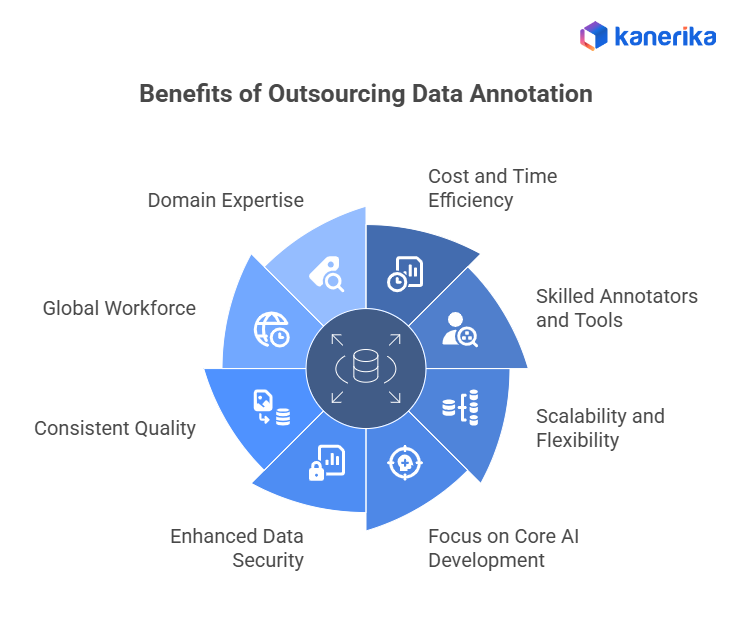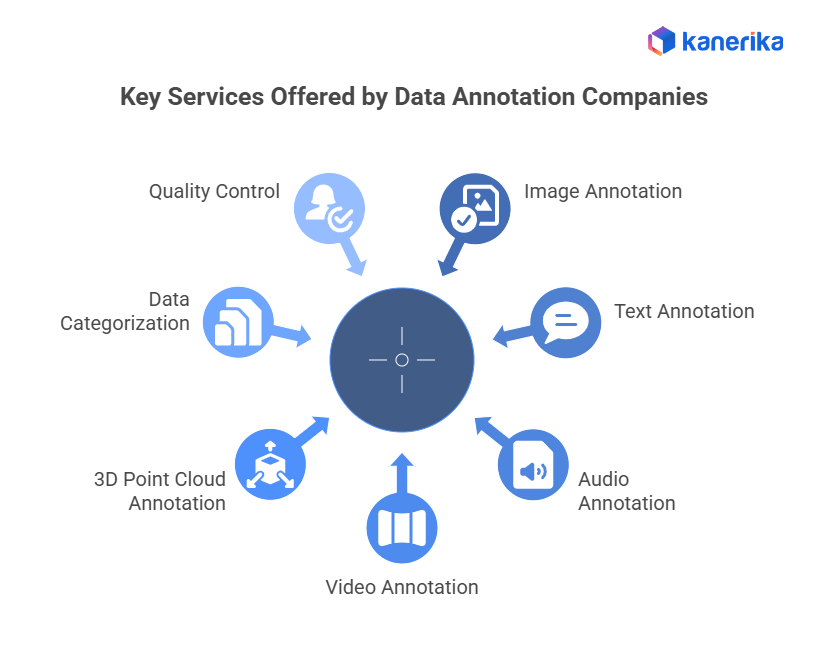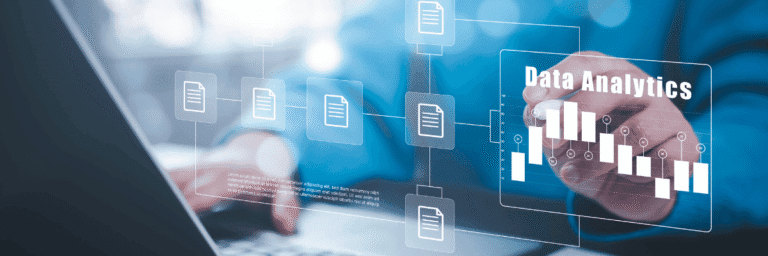When Tesla trains its self-driving cars or OpenAI improves its language models, it’s not just algorithms at work. Behind every accurate prediction are data annotation services that label millions of images, texts, and videos to help AI systems learn. In 2025, these services play a vital role across industries such as healthcare, automotive, and finance, ensuring that AI models are trained with precision and context.
The data annotation market is growing fast. According to Fortune Business Insights, it is expected to rise from $1.58 billion in 2024 to $13.2 billion by 2032, at a CAGR of 30.9%. As demand for clean, high-quality data increases, businesses are turning to specialized vendors that combine technology with human know-how to deliver accurate results.
In this blog, we’ll explore what data annotation companies do, how they maintain data quality, and why partnering with the right one can make a major difference in AI success. Continue reading to learn how they form the backbone of today’s intelligent systems.
Need accurate annotations for your ML models?
Partner with Kanerika for Expert AI/ML implementation Services
Key Takeaways
- Data annotation services are essential to AI accuracy, powering industries such as healthcare, automotive, and finance.
- Annotation types include image, text, audio, video, and 3D point cloud labeling—crucial for AI model training.
- Outsourcing annotation improves efficiency, scalability, accuracy, and compliance while reducing costs.
- Leading services cover data labeling, categorization, quality validation, and domain-specific expertise.
- Top companies in 2025 include Kanerika, Scale AI, iMerit, Labelbox, CloudFactory, Playment, Sama, and Labellerr.
- Choosing the right partner requires evaluating data type support, quality control, compliance, pricing, and scalability.
- Kanerika stands out for its AI-driven data automation, strong governance, ISO-certified security, and modular AI integration.
- Businesses that invest in reliable annotation partners gain a competitive edge through faster, cleaner, and smarter AI development.
What Is Data Annotation?
Data annotation is the process of labeling or tagging raw data, such as text, images, videos, or audio, so that machine learning models can recognize and interpret it accurately. It converts unstructured data into structured formats that AI systems can learn from. For example, when an image of a cat is labeled as “cat,” the AI system uses that information to identify cats in future images. Without accurate labeling, even the most advanced AI algorithms cannot perform well. Furthermore, it forms the foundation of supervised learning, helping AI systems make predictions, automate processes, and continuously improve with real-world feedback.
Types of annotation include:
- Image annotation: Tagging objects, boundaries, or features within an image to help computer vision models detect and classify them. Techniques include bounding boxes, polygon labeling, and semantic segmentation. Used in autonomous vehicles, medical imaging, and facial recognition.
- Text annotation: Labeling words or phrases to train NLP models for sentiment analysis, named entity recognition, and intent detection. Commonly used in chatbots, search engines, and translation tools.
- Audio annotation: Identifying speech, tone, pitch, or background sounds for tasks like transcription, emotion detection, and speaker identification. Essential for voice assistants and transcription software.
- Video annotation: Labeling objects across frames so models can understand movement and behavior. Functional for autonomous driving, security, and gesture recognition.
How it fits into AI model training:
Data annotation is central to AI model development, especially in supervised learning. The process typically involves:
- Data collection: Gathering raw data from various sources.
- Annotation: Tagging or labeling the data to add meaning and context.
- Model training: Feeding annotated data to algorithms for learning patterns.
- Validation and testing: Measuring model accuracy against real labels.
- Optimization: Improving models through feedback and retraining.
High-quality annotation improves accuracy, reduces bias, and boosts model performance in real-world use cases. In essence, annotated data acts as the foundation for all intelligent AI systems.
How Does Data Annotation Power AI Across Industries?
Explore how Kanerika’s data annotation services help train AI models with accurate, scalable labeled data.
Why Businesses Outsource Data Annotation
Outsourcing data annotation services has become a new and scalable solution for companies developing AI and machine learning models. As the demand for labeled data increases, businesses partner with professional data annotation companies to ensure accuracy, efficiency, and cost savings.
1. Cost and Time Efficiency
Setting up an in-house annotation team requires hiring staff, training, and purchasing tools, all of which can be expensive and time-consuming. In contrast, outsourcing removes these costs and speeds up the labeling process, allowing faster AI model deployment.
2. Access to Skilled Annotators and Advanced Tools
Data annotation service providers have trained experts who understand how to label text, images, video, and audio precisely. Additionally, they also use AI-assisted annotation tools that ensure accuracy and consistency while saving time.
3. Scalability and Flexibility
AI projects often need large volumes of labeled data that can change with time. Moreover, outsourcing makes it easy to scale up or down as needed. Whether it’s 10,000 images or millions of data points, external partners can handle projects of any size efficiently.
4. Focus on Core AI Development
When businesses outsource labeling, their internal teams can focus on core tasks — such as model design, algorithm improvement, and innovation — rather than spending time on repetitive data annotation.
5. Enhanced Data Security and Compliance
Leading data annotation companies follow strict data protection standards like GDPR and ISO 27001. Furthermore, they put in place secure data-handling practices and confidentiality agreements, making them reliable partners for industries such as healthcare and finance.
6. Consistent Quality and Accuracy
Outsourced annotation partners follow strict quality assurance processes involving multiple review levels and automated validation. As a result, this helps maintain consistency, reduces bias, and improves overall AI model accuracy.
Data Modernization Services 2025: Top Tools, Benefits, Best Practices
Unpack the key platforms, tangible outcomes, and proven steps to modernise your data ecosystem so you can move from reactive to forward-looking without disruption
7. Access to a Global Workforce and 24/7 Productivity
Most annotation vendors operate across different time zones, ensuring continuous work cycles. Consequently, this global setup speeds up turnaround times and ensures projects move forward without delays.
8. Domain Expertise and Customization
Professional annotation companies often focus on different industries such as healthcare, autonomous driving, retail, and natural language processing. They provide tailored labeling approaches that align with specific project goals, ensuring contextually rich, relevant data.
Outsourcing data annotation not only reduces costs but also ensures faster delivery, high-quality data, and better-performing AI models. Therefore, it helps businesses scale their AI initiatives efficiently while maintaining strong accuracy and reliability.

What Are Key Data Annotation Services?
Data annotation services offer a wide range of solutions designed to support AI and machine learning model training across industries. These services focus on labeling different types of data—images, text, audio, and video—to help algorithms accurately understand real-world information.
1. Image Annotation Services
Image annotation involves labeling objects, shapes, and regions within an image to help AI systems identify and classify them. Common methods include:
- Bounding box annotation for object detection
- Semantic segmentation for detailed pixel-level labeling
- Keypoint and landmark annotation for facial or body recognition
- Polygon annotation for irregular object shapes
These services are vital for applications such as autonomous vehicles, healthcare imaging, and facial recognition.
2. Text Annotation Services
Text annotation is key for natural language processing (NLP) tasks. It includes:
- Named entity recognition (NER) to identify names, places, and organizations
- Sentiment analysis to classify emotions or opinions in text
- Intent detection for chatbots and voice assistants
- Part-of-speech tagging and syntactic parsing for linguistic models
These help AI systems understand and process human language accurately.
3. Audio Annotation Services
Audio annotation focuses on labeling sound data for speech and acoustic analysis. Common tasks include:
- Speech-to-text transcription
- Speaker identification and diarization
- Emotion and sentiment labeling in voice data
- Sound event classification for environmental audio recognition
These annotations are used in applications such as virtual assistants, call center analytics, and voice recognition systems.
4. Video Annotation Services
Video annotation combines image labeling with temporal data to help AI models analyze motion and behavior. Techniques include:
- Frame-by-frame object tracking
- Action recognition
- 3D cuboid annotation for depth perception
- Event tagging for behavior analysis
Video annotation supports AI use cases in autonomous driving, surveillance, and sports analytics.
5. 3D Point Cloud Annotation
Created from LiDAR sensors and 3D scanners, point cloud annotation labels spatial data for autonomous vehicles, robotics, and AR/VR applications. Annotators identify objects in 3D environments to help models understand depth, distance, and object orientation.
6. Data Categorization and Classification
Data annotation companies also help organize large volumes of data into categories for easier processing. This includes sorting text, classifying images, and labeling datasets based on themes, products, or sentiments to improve AI efficiency.
7. Quality Control and Data Validation
Along with annotation, companies perform quality checks and data validation to ensure that every dataset meets accuracy and consistency standards. Many use hybrid approaches that combine human oversight with AI-powered validation tools.
By offering these diverse services, data annotation companies play a vital role in preparing high-quality training data that strengthens AI model accuracy, efficiency, and adaptability across industries.

Top 10 Data Annotation Service Providers in 2025
1. Appen
Appen is one of the world’s largest and most established data annotation service providers, offering high-quality labeled data for AI and machine learning. With a workforce of over a million skilled contributors, it delivers text, speech, image, and video annotations at scale. Appen’s services power applications in autonomous driving, generative AI, and speech recognition. Its strong focus on accuracy, scalability, and multilingual capabilities makes it a go-to partner for enterprises and tech leaders worldwide.
2. Scale AI
Scale AI is one of the most well-known players in the annotation industry, powering data for autonomous driving, LLMs, and computer vision models. Its Data Engine combines automation with human labeling to produce scalable, accurate annotations. By supporting complex modalities such as 3D sensor data and natural language text, Scale AI speeds up model iteration and reduces time-to-deployment for AI systems.
3. iMerit
iMerit provides domain-specific data annotation services with expert teams trained for precision. It supports image, text, audio, and video annotation tailored to sectors like medical imaging, insurance, and autonomous systems. Furthermore, its proprietary quality-control system ensures over 98% accuracy, making it ideal for mission-critical AI projects where precision in labeled data directly impacts model performance.
4. Labelbox
Labelbox merges an intuitive annotation platform with managed services, offering both automation tools and human know-how. It supports multiple data types, including text, PDFs, videos, and geospatial data. By connecting AI-assisted pre-labeling and customizable workflows, Labelbox enables faster, more efficient annotation cycles—helping companies build reliable datasets for model training.
5. CloudFactory
CloudFactory uses a “human-in-the-loop” approach that combines skilled human annotators with AI-driven tools. Its workforce is distributed globally, enabling scalability for projects that require thousands of labeled images or texts daily. Additionally, the company focuses on maintaining annotation accuracy while managing high-volume workloads for enterprises in computer vision, robotics, and speech recognition.
6. Playment (by TELUS International)
Playment offers data labeling and annotation for computer vision, with strong experience in autonomous vehicles and retail analytics. It uses a mix of manual and AI-assisted labeling to efficiently handle large datasets. Now part of TELUS International, Playment benefits from advanced infrastructure and global scalability, helping companies produce training-ready data at lower costs and faster turnaround times.
7. Sama (formerly Samasource)
Sama focuses on ethically sourced, high-quality data annotation. It trains annotators from underrepresented communities and delivers labeled data for computer vision, NLP, and sensor-fusion AI models. Consequently, Sama’s impact-driven model ensures data accuracy while promoting workforce inclusion, making it a trusted partner for socially responsible companies working on large AI projects.
8. Labellerr
Labellerr is an emerging, fast-growing platform that uses AI-assisted labeling and automation to speed up annotation and make it more affordable. It supports image, text, audio, and video data annotation with tools that allow real-time feedback and workflow customization. Its flexible model suits startups and enterprises aiming to scale their AI model development efficiently.
9. TaskUs
TaskUs has gained recognition as a leader in AI data annotation, combining human intelligence with advanced workflow technology. The company provides multimodal data labeling for text, audio, video, and image datasets, supporting the development of LLMs, chatbots, and generative AI models. TaskUs is known for its ethical data practices, rigorous quality assurance, and ability to handle large, complex projects quickly and securely. Its clients include top AI and tech companies looking for enterprise-grade reliability.
10. Bright Data
Bright Data, originally renowned for its data collection and web scraping capabilities, has expanded into data annotation services for AI and ML projects. It offers end-to-end solutions across text, image, audio, and video annotation, focusing on delivering accurate, real-world datasets. Leveraging its strong data infrastructure and automation tools, Bright Data helps organizations reduce labeling time while ensuring compliance and scalability. It’s particularly popular among businesses that require continuous, high-volume data labeling.
How to Select the Right Data Annotation Partner for Your Project
In 2025, the demand for reliable data annotation partners has surged as AI adoption deepens across industries. Experts say the right vendor can make or break a machine learning project. Accuracy, scalability, and domain know-how are no longer optional; they’re baseline requirements. Companies should start by checking whether the vendor supports the specific data type they need, such as image, text, audio, or video. For healthcare, legal, or automotive use cases, domain-trained annotators are key. Moreover, quality control processes, including multi-layer reviews and feedback loops, help reduce noise and improve model performance.
Security and compliance are also critical. Vendors handling sensitive data must comply with standards such as GDPR, HIPAA, or ISO 27001. Pricing models vary widely, so businesses should look for flexibility, whether it’s per-task, per-dataset, or hourly. Additionally, the best partners act as strategic allies rather than service vendors, offering customizable workflows, responsive communication, and continuous feedback loops. Finally, global delivery capabilities make a difference. Vendors with distributed teams can provide faster turnaround and 24/7 support. Therefore, the best partners combine speed, precision, and adaptability to meet evolving AI needs.
Kanerika’s Modular Approach to Data, Automation, and AI Integration
Kanerika builds AI-powered data analytics systems that help businesses turn raw data into usable insights. Using Microsoft tools like Power BI, Azure ML, and Microsoft Fabric, we design solutions for real-time dashboards, predictive modeling, and automated reporting. These systems support faster decisions and smoother operations across industries such as healthcare, finance, retail, and logistics.
Our services include predictive analytics, agentic AI, and marketing automation. We help teams forecast trends, understand customer behavior, and automate repetitive tasks. Furthermore, we also support cloud migration, hybrid environments, and strong data governance. With ISO 27701 and 27001 certifications, data privacy is built into every solution.
Kanerika’s AI agents—DokGPT, Jennifer, Alan, Susan, Karl, and Mike—are trained for specific tasks like document intelligence, risk scoring, customer analytics, and voice data processing. They work with structured, annotated data and fit easily into enterprise workflows.
We also offer data engineering and low-code automation. Our systems are modular and scalable, so teams can start small and expand as needed. Whether upgrading legacy tools or adding new AI capabilities, Kanerika helps businesses move with clarity and control.
Accelerate AI Development with Expert Data Annotation!
Partner with Kanerika for Scalable, High-Quality Annotation Services
FAQs
What do data annotation companies do?
Data annotation companies label and categorize raw data—such as images, text, audio, and video—so that AI and machine learning models can recognize patterns, make predictions, and improve accuracy.
Why should businesses outsource data annotation?
Outsourcing helps save time and costs while ensuring high-quality, large-scale labeled datasets. Professional annotation companies have skilled teams, quality checks, and tools that streamline the process more efficiently than in-house setups.
How do data annotation companies ensure accuracy and data security?
Leading companies follow multi-layer quality control, AI-assisted validation, and compliance standards like GDPR, HIPAA, and ISO 27001 to maintain data accuracy and privacy.
What types of data annotation services are available?
Common services include image labeling, text tagging, video frame annotation, speech transcription, sentiment analysis, and sensor data annotation for industries like healthcare, automotive, and retail.
How do I choose the best data annotation company for my project?
Look for expertise in your specific data type, proven accuracy rates, scalable workforce, data security certifications, flexible pricing, and seamless integration with tools like Labelbox, CVAT, or AWS SageMaker.









